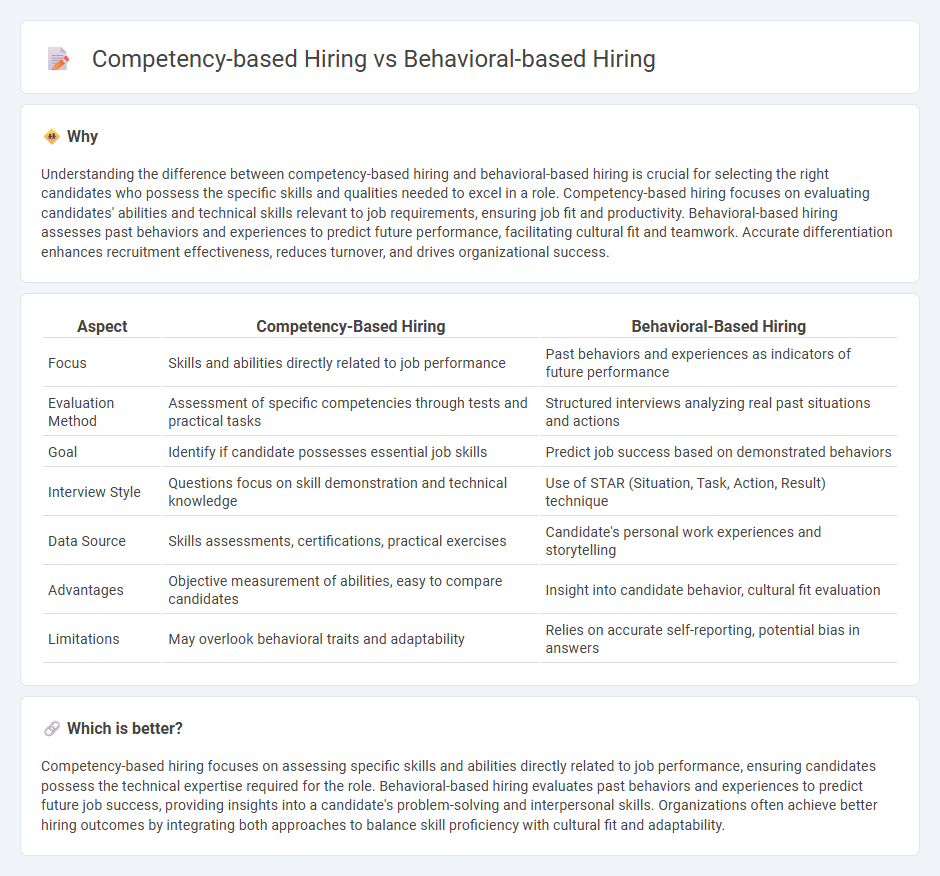
Competency-based hiring focuses on assessing candidates' specific skills and abilities aligned with job requirements, while behavioral-based hiring evaluates past experiences and actions to predict future performance. Organizations seeking precise skill matching often prefer competency-based methods, whereas those valuing cultural fit and adaptability tend to use behavioral interviews. Discover how these hiring approaches impact workforce quality and retention rates.
Why it is important
Understanding the difference between competency-based hiring and behavioral-based hiring is crucial for selecting the right candidates who possess the specific skills and qualities needed to excel in a role. Competency-based hiring focuses on evaluating candidates' abilities and technical skills relevant to job requirements, ensuring job fit and productivity. Behavioral-based hiring assesses past behaviors and experiences to predict future performance, facilitating cultural fit and teamwork. Accurate differentiation enhances recruitment effectiveness, reduces turnover, and drives organizational success.
Comparison Table
| Aspect | Competency-Based Hiring | Behavioral-Based Hiring |
|---|---|---|
| Focus | Skills and abilities directly related to job performance | Past behaviors and experiences as indicators of future performance |
| Evaluation Method | Assessment of specific competencies through tests and practical tasks | Structured interviews analyzing real past situations and actions |
| Goal | Identify if candidate possesses essential job skills | Predict job success based on demonstrated behaviors |
| Interview Style | Questions focus on skill demonstration and technical knowledge | Use of STAR (Situation, Task, Action, Result) technique |
| Data Source | Skills assessments, certifications, practical exercises | Candidate's personal work experiences and storytelling |
| Advantages | Objective measurement of abilities, easy to compare candidates | Insight into candidate behavior, cultural fit evaluation |
| Limitations | May overlook behavioral traits and adaptability | Relies on accurate self-reporting, potential bias in answers |
Which is better?
Competency-based hiring focuses on assessing specific skills and abilities directly related to job performance, ensuring candidates possess the technical expertise required for the role. Behavioral-based hiring evaluates past behaviors and experiences to predict future job success, providing insights into a candidate's problem-solving and interpersonal skills. Organizations often achieve better hiring outcomes by integrating both approaches to balance skill proficiency with cultural fit and adaptability.
Connection
Competency-based hiring and behavioral-based hiring are connected through their focus on identifying candidates' skills and past behaviors that predict future job performance, ensuring alignment with organizational competencies. Competency-based hiring evaluates specific skills, knowledge, and abilities tailored to job requirements, while behavioral-based hiring assesses candidates' previous actions and responses in work situations to reveal consistent patterns. Together, these approaches enhance the precision of talent acquisition by combining objective skills assessment with evidence of real-world application and cultural fit.
Key Terms
Past Experiences
Behavioral-based hiring emphasizes candidates' past experiences and specific actions taken in real work situations to predict future performance, using structured interviews and situational questions. Competency-based hiring focuses on assessing key competencies, such as skills, knowledge, and abilities, regardless of when or how they were developed, often through targeted assessments or simulations. Explore how these hiring methodologies impact talent acquisition effectiveness and organizational success.
Measurable Skills
Behavioral-based hiring emphasizes past actions and experiences as indicators of future performance, analyzing how candidates have handled specific situations to predict job success. Competency-based hiring centers on assessing measurable skills and qualifications directly relevant to the role, ensuring candidates possess the capabilities required for optimal performance. Explore further to understand which approach aligns best with your organizational goals and talent acquisition strategy.
Situation-Action-Result (SAR)
Behavioral-based hiring emphasizes past experiences by analyzing specific Situation-Action-Result (SAR) examples to predict future job performance, while competency-based hiring assesses candidates' abilities to demonstrate core skills and behaviors relevant to the role. SAR provides concrete evidence of how candidates navigated real challenges, highlighting practical application of competencies in workplace scenarios. Explore more to understand how integrating SAR into hiring strategies enhances candidate evaluation and improves recruitment outcomes.
Source and External Links
Behavioral Interviewing - University of Florida - Behavioral-based hiring focuses on the premise that a candidate's past job behavior is the best predictor of future performance, using structured questions to gain insights into past experiences for more informed hiring decisions.
Behavioral Based Interviewing: Human Resources - Northwestern University - Behavioral-based hiring involves asking candidates about specific past employment situations to predict future job performance, with emphasis on obtaining detailed examples of past behavior.
Behavioral Interviewing: Tips for Improving Your Hiring Process | CO - Behavioral-based hiring helps employers assess soft skills through structured, standardized questions about how candidates acted in past situations, improving fairness, reducing bias, and enhancing the overall interview process.
 dowidth.com
dowidth.com